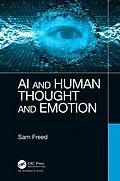The field of artificial intelligence (AI) has grown dramatically in recent decades from niche expert systems to the current myriad of deep machine learning applications that include personal assistants, natural-language interfaces, and medical, financial, and traffic management systems. This boom in AI engineering masks the fact that all current AI systems are based on two fundamental ideas: mathematics (logic and statistics, from the 19th century), and a grossly simplified understanding of biology (mainly neurons, as understood in 1943). This book explores other fundamental ideas that have the potential to make AI more anthropomorphic.
Most books on AI are technical and do not consider the humanities. Most books in the humanities treat technology in a similar manner. AI and Human Thought and Emotion, however is about AI, how academics, researchers, scientists, and practitioners came to think about AI the way they do, and how they can think about it afresh with a humanities-based perspective. The book walks a middle line to share insights between the humanities and technology. It starts with philosophy and the history of ideas and goes all the way to usable algorithms.
Central to this work are the concepts of introspection, which is how consciousness is viewed, and consciousness, which is accessible to humans as they reflect on their own experience. The main argument of this book is that AI based on introspection and emotion can produce more human-like AI. To discover the connections among emotion, introspection, and AI, the book travels far from technology into the humanities and then returns with concrete examples of new algorithms. At times philosophical, historical, and technical, this exploration of human emotion and thinking poses questions and provides answers about the future of AI.
Autorentext
Sam Freed is a researcher in the COGS centre for cognitive science at the University of Sussex. This centre spans departments as diverse as neuroscience and philosophy, psychology and computer science. Freed's background includes a career as a technologist starting as a research assistant in computer science at the age of 15 (at the Hebrew University, Jerusalem), work on Lotus 1-2- 3 during Ireland's 1990s boom, and managing international projects in internet security during the .com bubble. His education includes a BA in philosophy and comparative religion, an MA in cognitive science (both from the Hebrew University), and a PhD in informatics (from Sussex). His work centres on the relevance of the humanities to technology, and on the historical analysis of the mind-set behind current technology.
Klappentext
This reference work examines how human thought processes and emotion can be captured by artificial intelligence (AI) algorithms and code. It provides a theoretical framework and demonstrates how code can be generate on the basis of the framework. The book discusses at a high-level human nature, thinking, and emotions. It then examines more deeply introspection as a technique in the development of new AI technologies. At the core of this book is a set of novel AI algorithms based on human introspection and emotion.
Inhalt
1. Overview of the State of AI.
2. Critical Thinking about AI.
3. Human Intelligence.
4. Preconceptions and Assumptions.
5. The Argument for Using Introspection in AI.
6. Anthropic AI .
7. Subjectivity and Introspection in AI Development.
8. The Proposed Methodology.
9. The Benefits of Using Introspection.
10. Implementing the Methodology.
11. Algorithms and Examples.
12 Data Types and Example.
13. Conclusion.
